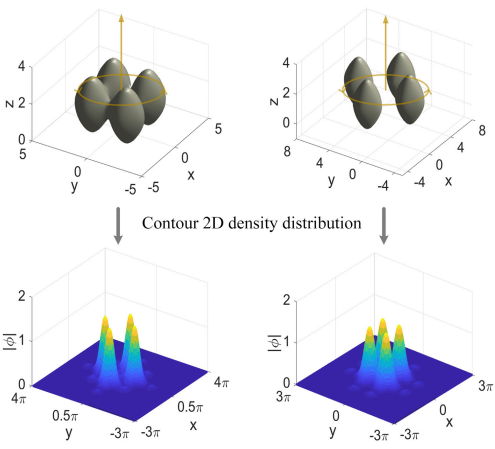Recently, a team led by Prof. Zeng Jianhua from Xi'an Institute of Optics and Precision Mechanics (XIOPM) of the Chinese Academy of Sciences (CAS) proposed a theoretical and numerical survey about matter-wave nonlinear gap modes of Bose-Einstein condensates with repulsive interparticle interactions in three-dimensional PT optical lattices with emphasis on multidimensional gap solitons and vortices. Their up-to-date result was published on iScience.
During last decades, many remarkable researches of parity time (PT)-symmetric systems in diverse physical field have been achieved and nonlinear waves in low-dimensional PT -symmetric non-Hermitian systems have recently been explored broadly. However, the issue of understanding these systems in higher dimensions still needs to be revealed.
Because of the catastrophic self-focusing nonlinearity poses an essential problem of critical and supercritical wave collapse (or blowup) in multidimensionality, stabilizing localized modes is challenging in attractive nonlinear Kerr media. To remedy this problem, some studies based on competing self-focusing and defocusing terms, others focus on regular periodic structures.
To offer new possibilities for studying one-dimensional gap solitons, Zeng and his team members revealed the creation and stability issues of 3D localized matter-wave gap modes of two types. Besides, they located the stable matter-wave gap solitons and vortices which always occupy the central part of the finite gaps in the associated linear band gap spectra.
In the framework of Gross-Pitaevskii equation, Zeng and his team members described the macroscopic matter-wave wave function (order parameter) U for dynamics of a BEC in 3D PT -symmetric optical lattices with the assistance of mean-field theory.
Two types BEC vortices loaded in 3D PT lattice. (Image by XIOPM)
In the future, the proposed work will provide a new guide for exploring and stabilizing 3D solitary gap states, and help achieve deep understanding of soliton physics in multidimensional PT periodic potentials beyond conventional Hermitian ones.
Contact:
SHE Jiangbo
Xi'an Institute of Optics and Precision Mechanics
E-mail: shejb@opt.ac.cn
Date of Publication: 2022-01-25



